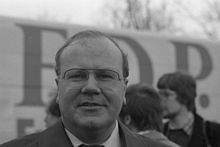Martin Bangemann
| Martin Bangemann | |
|---|---|

Bangemann in 1979
|
|
|
Federal Minister of Economics West Germany |
|
|
In office 27 June 1984 – 1989 |
|
| Preceded by | Otto Graf Lambsdorff |
| Succeeded by | Helmut Haussmann |
| Chairman of the FDP | |
|
In office 1985–1988 |
|
| Preceded by | Hans-Dietrich Genscher |
| Succeeded by | Otto Graf Lambsdorff |
| Personal details | |
| Born |
15 November 1934 Wanzleben, Saxony |
| Nationality | German |
| Political party | FDP |
| Children | 5 |
| Alma mater |
University of Tübingen University of Munich |
| Occupation | Lawyer |
Martin Bangemann (born 15 November 1934 in Wanzleben) is a German politician and a former leader of the FDP (1985–1988). He studied Law in Tübingen and Munich, earned a Dr. jur. (equivalent to J.S.D.) in 1962, and qualified as an attorney in 1964. He is married and has five children.
Bangemann was a member of the European Parliament from 1973 to 1984, from 1976 to 1979 he was vice-chairman, from 1979 to 1984 chairman of the Liberal and Democratic Group. Moreover, he was vice-chair of the Committee on Budgets from 1978 to 1979.
Bangemann was the German Federal Minister of Economics from 1984 to 1988.
In 1988, Bangemann joined the European Commission. He was Commissioner for the internal market and industrial affairs in the Delors Commission from 1989 to 1995. He was then Commissioner for Industrial affairs, Information & Telecommunications Technologies in the Santer Commission from 1995 to 1999.
As commissioner he led a "high-level group" that drew up the report "Europe and the Global Information Society" in 1994. This document contained recommendations to the European Council on the measures that Europe should take regarding information infrastructure. It became known as the "Bangemann report" and influenced many EU policies.
...
Wikipedia
